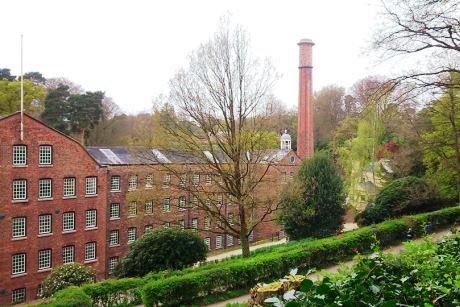Quarry Bank Mill in Cheshire is currently undergoing a £9.3 million renovation project. STO went along to find out what this means for the future of school trips at the National Trust property.

As one of the best-preserved textile mills of the Industrial Revolution, Quarry Bank Mill is an obvious choice for teachers. Its current education offering is expansive. The National Trust property offers teachers extensive resources to assist with self-led visits around both the mill and Styal Village; the village in the grounds of the mill where its workers lived in the 19th century.
A wide range of facilitated tours and educational sessions – all linked to the National Curriculum – are also available. The current offering includes History, Science, Geography, Design, and Drama-linked sessions.
Examples include…
A Wash Day & Chores workshop for Key Stage 1, which gives pupils the opportunity to find out what it took for Victorians to wash their clothes and do other chores.
A Toys & Games session for Key Stage 1, which gives children hands-on experience of the types of games their Victorian counterparts played with in the past.
A Discover the River Bollin experience for Key Stage 2, which gets pupils outside to do practical fieldwork and to learn about the effect the river has on the landscape, and the life it fosters.
Textiles for Key Stage 1 and 2, which gives pupils the opportunity to try carding, weaving and spinning, and teaches them how cloth is made.
A History session for Key Stage 3 that gives pupils the opportunity to investigate the events surrounding the death of John Foden; a child working long hours at the mill. This session delves into the working conditions of the Industrial Revolution.
Plus there are Key Stage 4 sessions, which ask pupils to consider historical sources and interpretation.
Brand-new exhibition
On 29th April, a brand new site-wide exhibition will open at the property. The Worst Children’s Jobs in History (at Quarry Bank) will be an interactive exhibition, ideal for investigations by school children.
As part of the exhibition, pupils will be able to take part in a fun hands-on activity that allows them to experience what it was like to be a scavenger at the mill. Children were often employed in this dangerous role, which involved them cleaning the area beneath the mule machine, and escaping at intervals before they got trapped inside it.
Pupils will also be able to complete activities that give them a feel for what it was like to climb chimneys, catch moles, and to clean the cess pits.
The next generation of school trips
The education offering at Quarry Bank Mill is only set to get better in the new school year.
Quarry Bank Mill is currently undergoing a £9.3 million renovation project. In 2013 the National Trust launched a public appeal to raise money to transform the visitor experience at the site. In 2015, the Heritage Lottery Fund revealed it would be adding £3.9 million to the project’s coffers, and in 2016 work began to transform the site.
The first phase of renovations has just opened. The upper garden and glasshouse has now been restored, allowing visitors to learn the unexpected history of the exotic plants – like pineapples – that were grown there in the 19th century.
The next big opening will be the Greg family home and a workers cottage in autumn. Education sessions won’t take pupils directly into these buildings. However, guided tours will take classes past them, and linked workshops will bring their history to life.
Quarry Bank is also in the process of opening a new outdoor learning area with a new pond-dipping platform and shelter so it can be used all year round.
Between November 2017 and spring 2018, the mill building will close to the public while work is carried out on a goods lift to make all five floors of the mill completely accessible.
During this time education sessions will still run at Quarry Bank.
“We’re going to use the closure of the mill building as a reason to zhuzh up our education offering,” explained Julie Pugh, formal learning officer at Quarry Bank Mill. “We want to hand learning over to the children more. We want to make it even more exciting for them.”
The zhuzh-ing will include a new Forest Schools programme, and an increased STEM offering. The education team is also looking at building on a demand for new Reward Days, including opportunities for pupils to take part in bushcraft sessions.
To find out more about school trips to Quarry Bank Mill visit www.nationaltrust.org.uk/quarry-bank.










